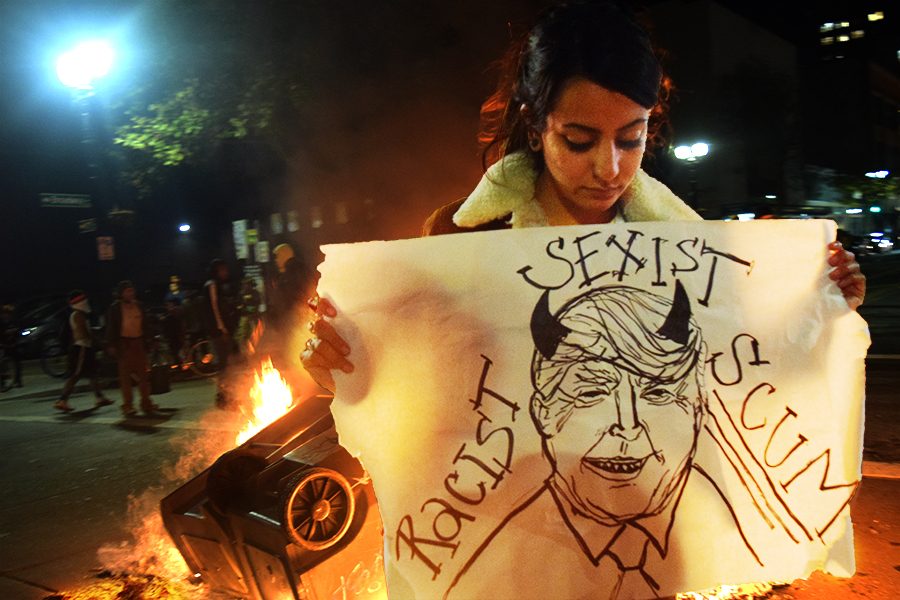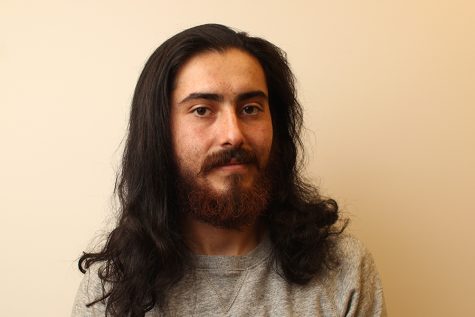Election results spur outrage
Republican victories blindside liberals, communities react
A protester holds up a sign in front of a trash can set on fire during the #TrumpProtest in Oakland, California on Nov. 9, 2016.
Nov 16, 2016
In the wake of the 2016 election cycle, Californians voted for local ballot measures, state propositions and candidates — but people nationwide were shocked by the results at the federal level.
President-elect Donald Trump’s electoral victory on Nov. 8 has triggered a nationwide historic ripple effect throughout diverse communities of people who have been the target of his divisive rhetoric on the 2016 election trail.
Despite winning the popular vote by about one million votes, Democratic Party candidate Hillary Clinton was beaten 290 to 232 in Electoral College votes.
Protests have sprouted nationwide since Trump’s call for unity during his acceptance speech in New York early on the morning of Nov. 9.
Contra Costa College political science department Chairperson Vanna Gonzales said many of her students have become discouraged and given up hope that the U.S.’s democratic republic reflects their values of acceptance, diversity and inclusion regardless of cultural differences.
Gonzales said open discussions about the election results in her classes focused on signing petitions to be sent to red state representatives who have promised to vote for Trump when the Electoral College officially casts its ballot on Dec. 19.
Many people living in the Bay Area, and other liberal cities across the nation, were blindsided and have started to organize to impeach or influence the Electoral College representatives to switch candidates.
She said it is important for people to understand the popular vote and the Electoral College’s vote are connected on a state-by-state level and not at a national level.
So while Clinton won the popular vote in many states because urban areas voted resoundingly in her favor, the working class white voter in electoral swing states like Michigan, Pennsylvania, Iowa and Florida gave Trump and his campaign just enough votes to win the Electoral College.
While she encourages students to express themselves and protest, she explained that changing the decisions of the Electoral College representatives is a steep climb.
“Even in states with the minimum of three representatives, all three would have to say ‘we know one candidate got more votes than the other, but we are going to thwart the popular vote and everything we stood for in our party and vote for other candidate’,” she said. “The likelihood of that happening is very remote.”
Students enrolled at CCC, and throughout the Bay Area, fear that Trump will follow through with his threats to marginalize certain groups of people through policies he could pass through a Senate and House of Representatives, each controlled by a Republican majority vote.
Puente Club and La Raza Student Union organized an “Undivided” march to San Pablo City Hall from the Student Services Center Plaza on campus on Thursday to denounce Trump’s comments depicting Mexican people as “illegals,” “criminals” and “rapists.”
“Protesting does two things. It lets people feel supported and know they are not along although half the nation decided to elect Trump,” English as a second language major Marcela Sanchez said. “It also allows other people who didn’t vote to be more conscious of what could happen when you don’t.”
About 100 CCC students and Middle College High School and Gateway to College students rallied with signs that targeted Trump’s misogynistic comments toward women, polarizing depiction of Muslims and passive approach to defending LGBT+ rights within states that have passed discriminatory legislation.
La Raza studies department Chairperson Agustin Palacios said like most people he was in disbelief that the Republicans swept all three federal elections.
“Hillary won the popular vote and the Electoral College has become a big focus for protesters,” Palacios said. “But it is ironic that Trump said the system was rigged throughout his entire campaign and Democrats have defended the system. Now Democrats are complaining that the system is rigged.”
He said the best candidate to defeat Trump would have been Vermont Sen. Bernie Sanders.
According to The Advocate poll (May 13, 2016) of 350 people on campus during the Democratic primary election, 70 percent voted for Sanders, 17 percent for Clinton, 8 percent did not choose a candidate and 2 percent voted for Trump.
Some students are seeking to remain optimistic.
“I really hope the GOP buffers him. I know they are not all idiots. There are many Republicans who are morally and ethically opposed to Trump and his proposed policies,” Community Organizing Political Action club Vice President Jose Arebalo said. “I don’t think his presidency will be as bad as his campaign.”
Despite some people feeling as though Trump will not be able to accomplish what he has promised to white-collar workers who voted for him, many people are discontented with the entire election process.
ASU President Safi Ward-Davis said while she voted, she doesn’t believe a vote for Clinton would have made a significant difference as more information was coming out about the FBI’s investigation into her private email server, and Trump was under scrutiny for fraud and comments he made 11 years ago.
“I don’t know if Hillary won we would be better off because of all of the baggage both candidates had,” Ward-Davis said. “Either way we voted we were going to lose as Americans.”
Former political science professor Leonard McNeil said the main failures that allowed Trump to rise to power are the Democratic National Party presenting no cogent or progressive agenda that spoke to the needs of the voters and corporate media’s complicity.
“The DNC shot itself in the foot when it worked with Clinton to step in to undermine Sanders and his populist campaign tactics,” McNeil said.
“Donald Trump tapped into an anti-establishment movement and the anger among working people like Sanders did, but Trump manipulated people in a different way. He focused his campaign on nativism, isolationism and xenophobia,” he said.
“It was not necessarily a racist campaign, but Trump was there to organize and galvanize sentiment around an anti-establishment platform that the Clinton camp represented.”
McNeil said media complicity in the elections by giving free broadcast time and framing certain issues boosted misinformation leading to Republicans controlling all three branches.




Kat Johnson • Nov 18, 2016 at 7:45 pm
Most impressed! The expertise and professional coverage of your journalism team. What an engrossing group of journalist you all got right in the mix and wrote detailed, informative, and important happenings. The photos as good or better than any out there. You all shine! Thank you. I truly enjoy the newspaper and I look forward to following your careers. Kudos to your well qualified leader!